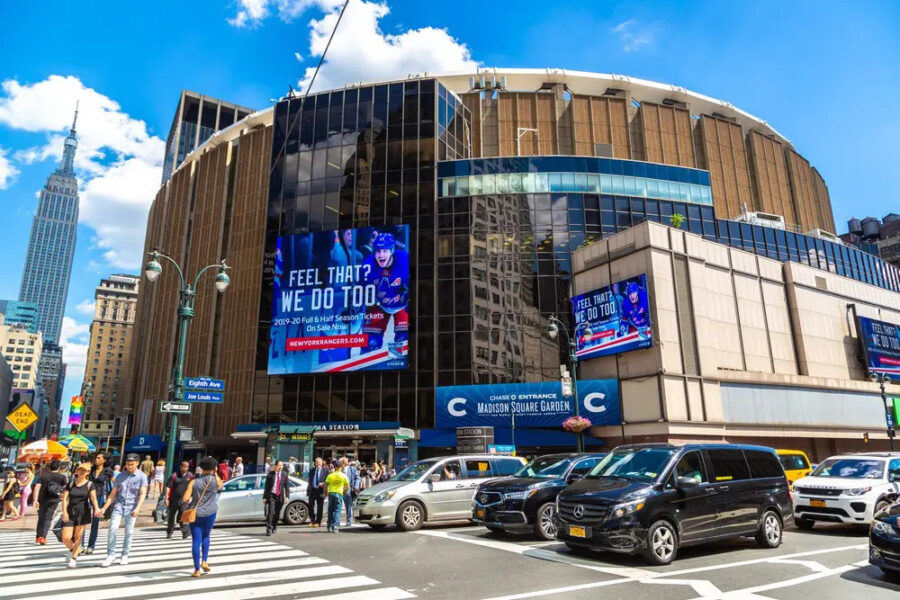New Yorkers divided over sports betting, poll finds

A new poll by national survey conductor the Siena Research Institute has found that New Yorkers are divided regarding their opinions on sports gambling.
The poll found that 39% of the 814 New York residents surveyed believe online sports betting regulates and taxes a formerly illegal activity while adding more entertainment for fans, while 37% say it increases problem-gambling risks, financial hardship, and game integrity.
Regarding football, 49% identified themselves as football fans, and 31% of those said they place bets on football games through an online sportsbook, which is higher than the 20% of the total surveyed.
For baseball, 39% of respondents said they were baseball fans, with 30% of those saying they place bets on baseball games, compared to 14% in general.
“While more New Yorkers say that they are football fans than baseball fans, nearly half of all New Yorkers and 93% of baseball fans plan to watch the baseball playoffs,” Siena Research Institute Director Don Levy said in a news release. “Just over 40% regularly watch football games, including 79% of football fans.”
The poll comes as last week the New York State Gaming Commission granted daily fantasy sports operator PrizePicks an interactive fantasy sports operating license, and the company is expected to launch in the coming weeks.
Abi Bray brings strong researching skills to the forefront of all of her writing, whether it’s the newest slots, industry trends or the ever changing legislation across the U.S, Asia and Australia, she maintains a keen eye for detail and a passion for reporting.
Verticals:
Sectors:
Topics:
Dig Deeper
The Backstory
Why the split resonates beyond New York
New York’s mixed feelings about online sports betting sit at the nexus of a national expansion and a rising scrutiny of gambling’s social costs. The state is the country’s largest mobile wagering market by handle, and public opinion there often sets tone for regulators elsewhere. The sharper the divide, the greater the pressure on policymakers to prove the industry’s tax benefits outweigh risks to consumers and game integrity. That tension mirrors developments across the United States and abroad, where growth is robust, participation is widening and enforcement actions are mounting.
The latest fissures in sentiment come as American bettors spend more and engage more frequently, even as retention trails global peers. They also land amid headline-grabbing investigations into alleged spot-fixing and prop-bet manipulation that have put a spotlight on oversight. With football and baseball driving seasonal interest, New York’s ambivalence underscores a broader recalibration: how to preserve tax revenue and fan engagement while curbing problem gambling and protecting competition from manipulation.
Spending outpaces the world, but loyalty lags
National data shows Americans are wagering at a clip that exceeds global norms. According to Optimove’s U.S. Gaming Pulse, the average deposit by U.S. players rose 10% year over year to $604 in May, compared with a 2% global increase. In casino play, U.S. bettors spent an average of $8,259 that month, more than six times the global average, while the number of casino bettors jumped 30% from a year earlier. Sports betting spend averaged $1,001 per month versus $380 globally, with a 14% rise in the number of sports bettors.
Yet those gains mask softer customer engagement. U.S. players were active 7.9 days during the month on average, below the global 8.9, and retention trailed at 65% versus a 71% global benchmark. For New York, which relies on sustained activity to meet tax projections, the engagement gap could mean more aggressive promotions or product innovation to keep casual bettors participating between marquee events. It also complicates responsible gambling efforts: the same tactics that extend engagement risk drawing in higher-friction customers who may struggle with limits.
Young cohorts drive growth and risk
The surge is powered by younger adults whose financial cushions are thinner. A TransUnion analysis reported in Complete iGaming found gambling participation in the U.S. climbed to 30% in the second quarter from 25% a year earlier, driven by Gen Z and millennials. Thirty-four percent of Gen Z and 42% of millennials reported regular gambling, with younger participants skewing to mobile apps and speculative behavior alongside crypto trading and investing. Millennials increased activity across land-based and online channels, while Gen Z growth was concentrated in online sports betting.
The demographic momentum carries fiscal upside for states but heightens vulnerability to swings in disposable income and credit costs. TransUnion flagged that millennial debt payments rose 20% year over year and Gen Z’s debt climbed 27%, outpacing wage growth. That dynamic helps explain why some New Yorkers see legalized betting as an entertainment and tax boon while others focus on financial harm. It may also limit the durability of growth if consumers pull back under debt pressure, a risk for budget planners who count on steady tax flows from operator gross revenue.
Integrity alarms move from niche to mainstream
Concerns about game manipulation have shifted from isolated anecdotes to federal investigations that touch both professional and college sports. A probe into a suspected NBA-linked gambling ring has already yielded cases tied to prop bets and performance manipulation and now includes alleged illegal wagers on men’s college basketball, according to reporting on the ongoing investigation. Accounts connected to the ring allegedly bet against Eastern Michigan, Mississippi Valley State and North Carolina A&T, with player suspensions at one school following for undisclosed team-rule violations.
For regulators, these episodes sharpen the argument for monitoring tools, tighter data-sharing and limits on certain prop markets, especially those vulnerable to manipulation. For the public, they complicate the entertainment narrative that underpins support for legal wagering. In a state like New York, where fans are highly engaged and betting volumes are large, integrity worries can quickly translate into calls for stricter rules, more enforcement resources and clearer protections for college athletes.
Policy experiments and their lessons
Other markets offer clues on how regulation may evolve. California, which has yet to legalize sports betting, is testing approaches in the court of public opinion and tribal politics. A recent proposal from the Sports Betting Alliance to centralize operations under a single tribal entity with a limited number of operators drew swift skepticism from tribal leaders, with one prominent voice declaring it “DOA,” as detailed in coverage of the alliance’s plan. The pushback suggests any future framework in the largest U.S. state will hinge on tribal sovereignty and revenue guarantees, a dynamic New York policymakers track closely given potential cross-border effects and competitive pressure.
Internationally, Brazil’s rapid market ramp illustrates both opportunity and risk. Sports betting was legalized in 2018 but launched in January, and participation has since spiked. A national survey found 36% of Brazilians over 16 wagered in the last year, up from 24% in the prior poll, or roughly 56.1 million people. Regulators responded with harm-mitigation rules, including self-exclusion and bans on wagering by certain welfare recipients. Even so, debt tied to online betting more than doubled to 35% from 16% in less than a year. The Brazilian experience bolsters arguments in New York for early, well-funded responsible gambling programs, robust advertising standards and data-driven interventions.
What’s at stake for Albany and operators
New York’s divide will set the tone for the next phase of regulation and enforcement. If concerns about addiction and integrity intensify, expect proposals to restrict specific bet types, expand funding for problem gambling services and tighten marketing. Operators may see tougher compliance costs and narrower product sets but gain from clearer rules that build public trust. If the state prioritizes tax maximization and entertainment, it will lean on technology and monitoring to balance growth with safeguards, using national trends as a guidepost.
The broader market signals caution. Americans are wagering more than their global peers, driven by younger bettors with rising debt and enthusiasm for mobile play. Integrity investigations are no longer outliers. Other jurisdictions are experimenting with rules that curb harm yet still deliver revenue. New York’s public is reflecting those crosscurrents in real time. How lawmakers, regulators and the industry answer them will shape the sustainability of the state’s betting boom and whether skepticism hardens into policy constraints or softens with credible protections.







